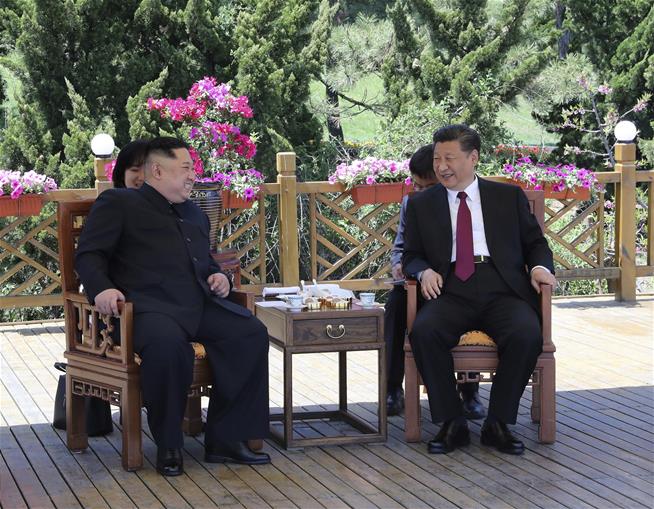Media Report

- The Washington Post reports: "Chinese President Xi Jinping will not attend celebrations of the 70th anniversary of North Korea's founding this weekend but will send a top ally to represent him instead, the ruling Communist Party announced Tuesday. Speculation had swirled over whether Xi would attend the celebrations following three visits to China this year by North Korean leader Kim Jong Un. Analysts said a decision by Xi not to travel to Pyongyang would indicate that Beijing expected further actions from Kim, including real signs of progress toward denuclearization. The party's International Department said Xi would be represented by Li Zhanshu, the party's third-ranking official and head of China's rubberstamp parliament."
- TIME reports: "In recent years, the annual meeting of the U.S. soybean export group has been a celebratory affair complete with a grand signing ceremony during which attendees committed to exporting billions of dollars of U.S. soybeans to China. But following months of escalating trade tensions Chinese attendees at this year's confab in Kansas City last week carried a different message: China doesn't need U.S. soybeans. In a keynote presentation, a leading official from China's grain sector laid out how the country not only can buy soybeans elsewhere but can also switch to entirely different types of crops to supply its livestock and feed its population. Such a move would undercut global demand for soybeans and prevent the U.S. from simply turning to other countries."
- NBC News reports: "China has steadily loosened restrictions on trade with North Korea in recent months, undercutting President Donald Trump's effort to exert economic pressure on Kim Jong Un's regime, former U.S. officials and independent experts told NBC News. From coal shipments to revived construction projects to planes ferrying Chinese tourists to Pyongyang, China has reopened the door to both legal and illegal trade with the North, throwing the North Korean government a vital lifeline while derailing U.S. diplomacy. North Korea depends almost entirely on its larger neighbor to keep its economy afloat. The increase in trade can be traced back to March, when the White House stunned Beijing by announcing plans for Trump to hold an unprecedented meeting with the North Korean dictator. Fearing a loss of influence with its often recalcitrant ally, China invited Kim to three successive summits in China, in March, May and June."
Calendar
- 2018-09-04 Trump’s Fight With Canada Over Nafta Faces New Hurdles
- 2018-09-03 China's leader Xi looms large over North Korean anniversary
- 2018-09-02 OK, So China Will Surpass the US Economy. Then What?
- 2018-08-31 China’s State Media: Trump Tweets Come From an ‘Alternative Universe’
- 2018-08-30 Trump Says China To Blame For Hurting U.S.-North Korean Relations
- 2018-08-29 With Ships and Missiles, China Is Ready to Challenge U.S. Navy in Pacific
- 2018-08-28 China moves to end two-child limit, finishing decades of family planning
- 2018-08-27 China’s new currency policy is a dovish signal in the trade war, analysts say
- 2018-08-26 Trump is right. His trade war with China is causing a huge problem with North Korea
- 2018-08-24 White House Criticizes China Over El Salvador Recognition
News
- The Washington Post China's Xi to send top ally to North Korea anniversary
- TIME China's New Threat Against Trump Has Some U.S. Farmers Nervous
- NBC News China eases economic pressure on North Korea, undercutting the Trump admin
- The New York Times A Top Chinese Official (Not Xi Jinping) Will Visit North Korea
- The Wall Street Journal China and African Nations Deepen Ties Despite Debt Concerns
- Bloomberg Chinese, Hong Kong Stocks Resume Slide as Tariff Threat Builds
- Inside Higher Ed Repressive Experiences 'Rare but Real' in China Studies
- Financial Times China's policy choices crucial for global financial stability
- The Wall Street Journal China to Send Senior Aide to North Korea's Anniversary Instead of President Xi Jinping
- Bloomberg U.S. Trade Gap Widens Most Since 2015; Record China Deficit
- NPR Police In Minneapolis Say Chinese Billionaire's Arrest Was For Alleged Rape
- Al Jazeera At China-Africa summit, officials dismiss debt criticism
Commentary
- Forbes Trade War Update: China To Suffer Greater Loss Of Income Than U.S.
- The National Interest This Is How Bad a U.S.-China War Would Be (In 2030)
- Defense One The China Hype
- The Verge China's top streaming service hides video view counts after click farms inflated numbers
- NPR China's Repression Of Muslim Uighurs Is Apparently Growing More Intense
- Seeking Alpha China's Belt And Road Initiative Opens Up Unprecedented Opportunities
- Bloomberg Don't Give Up on North Korea
